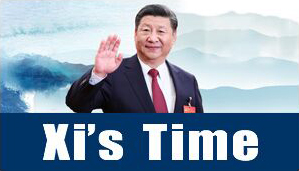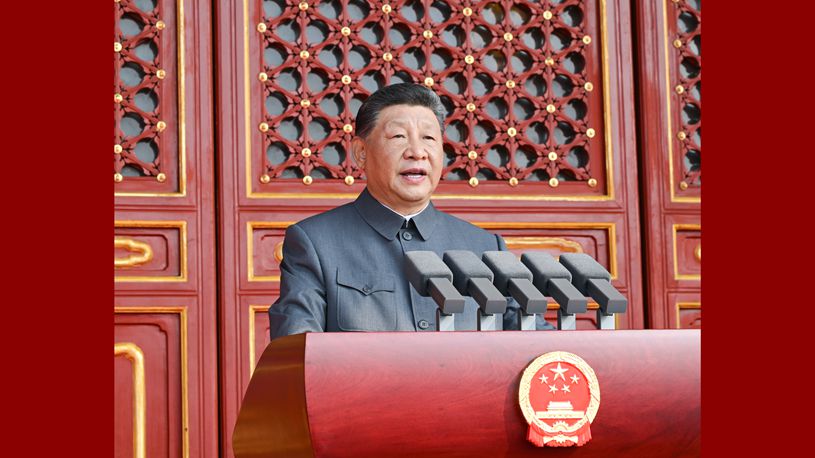Xinhua Headlines: World experts say China honors history, reaffirms peaceful development in grand parade
Source: Xinhua
Editor: huaxia
2025-09-04 23:26:03
* Experts worldwide said the parade was a solemn reaffirmation of China's unwavering commitment to peaceful development, while also conveying a powerful message of upholding international fairness and justice.
BEIJING, Sept. 4 (Xinhua) -- China held a grand military parade in central Beijing on Wednesday to mark the 80th anniversary of the victory in the Chinese People's War of Resistance against Japanese Aggression and the World Anti-Fascist War.
Chinese President Xi Jinping, also general secretary of the Communist Party of China Central Committee and chairman of the Central Military Commission, oversaw the parade and reviewed the troops.
In his speech delivered before the parade, Xi noted that the Chinese people made a major contribution to the salvation of human civilization and the defense of world peace with immense sacrifice in the war. Reiterating China's commitment to peaceful development, Xi called on nations to prevent historical tragedies from recurring, and emphasized that humanity's cause of peace and development will prevail.
Experts worldwide agreed that the parade was a solemn reaffirmation of China's unwavering commitment to peaceful development, while also conveying a powerful message of upholding international fairness and justice.
REMEMBERING HISTORY
Many observers have said that the parade highlighted the importance of remembering history and honoring the fallen.
David Orzan, ambassador in World of Excellence of the northeastern Italian city of Gorizia, said that China's sacrifices and perseverance "should be remembered by the entire world." He said that Xi's speech helped the world remember history and prevent the recurrence of tragedy.
Atsushi Koketsu, professor emeritus at Yamaguchi University in Japan, held a similar view. He said that Xi's address underscored the vital role of history as a mirror reflecting the present and the future.
The expert also expressed regret that Japan remains "extremely weak" in its attitude toward acknowledging historical truths, warning that "Those who do not learn from history are bound to be punished by it."
Describing China's contribution to the anti-fascist war as "indispensable," Anthony Jones, chairman of the Lisbon Maru Memorial Association in Britain, said, "It's really important that we remember the enormous sacrifices made by the Chinese people and by people everywhere all around the world who were fighting against fascism at that time."
Jones is also the grandson of Thomas Theodore Jones, a survivor of the Lisbon Maru incident. In 1942, the Lisbon Maru, a cargo ship requisitioned by the Japanese army to transport more than 1,800 British prisoners of war, was torpedoed by a U.S. submarine off the Zhoushan Islands in east China's Zhejiang Province. As the vessel sank, the Chinese fishermen of Dongji Island of Zhoushan saved 384 British soldiers from drowning under Japanese gunfire.
"It's very much our duty to make sure the lesson of history is never forgotten. So that future generations understand the cost of war and also the value of peace," Jones said. "Recognizing this is not just about seeking credit, but about acknowledging a victory that was truly a global effort."
Sead Dulic, president of the Federation of Antifascists and National Liberation War Veterans of Bosnia and Herzegovina, highlighted the significant role of the Communist Party of China in organizing, mobilizing, and sustaining national resistance against Japanese aggression. He noted that young people today need to be presented with the true history of World War II.
COMMITMENT TO PEACE
Several scholars emphasized that the parade reiterated China's long-standing commitment to peaceful development.
"Beyond the display of equipment, what moved us most was the discipline, unity and sense of mission demonstrated by the People's Liberation Army," said Jinith De Silva, president of the Sri Lanka China Society. "It was a vivid reminder that China's strength is not wielded for aggression, but for the defense of sovereignty, the preservation of stability, and the promotion of global peace."
Andrey Gubin, an associate professor at Russia's Far Eastern Federal University, said Xi's call for dialogue and peace and the statement that China stands on the right side of history are correct and beyond dispute. "I believe that the overwhelming majority of states in the world support China's position," he said.
Sheradil Baktygulov, director of the Institute of World Politics of Kyrgyzstan, said the parade has reminded people that "the military is needed to protect the peaceful development of the country, and not to coerce other countries."
China "never threatens other countries with unilateral sanctions or armed invasion," but "strives for a peaceful resolution of all disputes" and "consistently defends the principles of peaceful coexistence," he added.
Mostafa Amin, an Egyptian researcher on Arab and international affairs, said the military parade shows that "China has the strength to protect its own peaceful development and to contribute to global peace."
Orzan, who has visited China multiple times, strongly identifies with China's concept of peaceful development. "China possesses one of the world's most outstanding diplomatic capabilities, consistently achieving its objectives through dialogue rather than resorting to war," he noted.
Humphrey Moshi, professor of economics and director of the Center for Chinese Studies at the University of Dar es Salaam in Tanzania, said Xi's words deeply resonate with Africa.
"For us, peace is the foundation of development. Only with peace can industrialization and modernization be achieved," he said.
Stephen Ndegwa, a Kenyan expert on international issues, said the military parade is more than a display of strength -- it is a symbolic reminder of history and a reaffirmation of China's commitment to peace.
"The parade demonstrates that while China possesses the capability to defend itself, its ultimate goal is to deter conflict, uphold justice, and ensure stability," he said.
SHARED FUTURE FOR HUMANITY
"Today, humanity is again faced with a choice of peace or war, dialogue or confrontation, and win-win outcomes or zero-sum games," Xi said, stressing that "the Chinese people will stand firmly on the right side of history and on the side of human progress, adhere to the path of peaceful development, and join hands with the rest of world to build a community with a shared future for humanity."
Many viewed Xi's speech as a timely call for global cooperation amid turbulence, noting that it sends a powerful message about humanity's path ahead.
Ndegwa from Kenya said he believed that Xi's speech reinforced "the need for fairness, justice and cooperation in today's global order."
"The speech speaks directly to the challenges of our time ... and it affirms China's vision of peace and development as inseparable pillars of global progress -- something Africa strongly identifies with," the scholar said.
Victor Julius Ngoh, a professor of history from Cameroon, said that Xi's message "is a rallying call for global peace and justice," adding that it appealed to "the consciences of all, especially powerful leaders," to build peace and development for humankind.
Among those international guests invited to watch the parade in Beijing was 73-year-old Elyn MacInnis, whose father-in-law was one of the Flying Tigers, the American volunteer pilots who fought alongside Chinese forces against Japanese aggressors during World War II. She said the world once rallied to defeat fascism and must now rally to safeguard peace.
"To honor the past is to carry forward the wisdom that peace is extremely precious and cannot be preserved easily. We have to work for it," said MacInnis, also founder of "Friends of Kuliang," a group that gathers descendants of U.S. families who once lived in Kuliang, Fujian Province.
Serik Korzhumbayev, editor-in-chief of the Delovoy Kazakhstan newspaper, said: "Having suffered the catastrophe of invasion and immense human loss, China firmly believes that only peace and cooperation can serve as the cornerstone of development."
(Video reporters: Li Xuejun, Chen Dongshu, Wu Yue, Xu Jiatong, Zeng Tao, Zheng Mengyu, Dai He, Sun Nan, Mao Pengfei, Wang Jiawei, Cheng Yiheng, Chen Ying, Shi Zhongyu; video editors: Hong Ling, Zhu Cong, Roger Lott) ■





